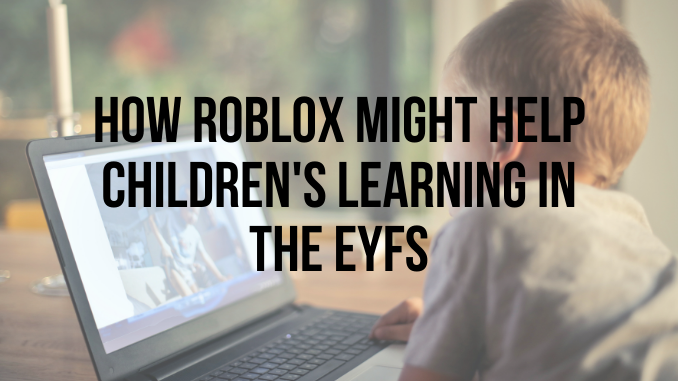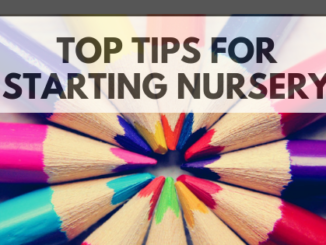The issues with too much screen time have long been documented and discussed, and many teachers, particularly those in the EYFS, take issue with children’s “obsession” with computer games. Of course, children permanently glued to screens is no one’s idea of great Early Years practice but if the pandemic has taught us anything it’s that technology has plenty of benefits! So here we take a look at one of the games that is popular with children of all ages; Roblox.
What is Roblox?
Roblox is an online gaming platform which offers multi-player gaming and a game-building tool. There are literally hundreds of thousands of games within Roblox that children can choose to play, all created by other users and children can also try their hand at game development. Part of Roblox’s popularity and appeal is the amount of variety that it offers, and the fact that almost all of it is free.
There is an in-game currency called, ‘Robux’ which can be purchased in order to buy enhancements and improvements within games, and a subscription service called the Builders Club which provides additional features is also available for a membership fee.
 Learning benefits of computer games
Learning benefits of computer games
There are plenty of benefits to learning that can come through playing computer games especially as these games are particularly engaging to children meaning that learning and mastery of different skills are achieved in a pleasant way (Gee, 2008)
When children are enjoying their learning, they gain more knowledge (Giannakos, 2013) and become more interested in a subject (Iten & Petko, 2014) highlighting the potential for games, like Roblox, to be used as a learning resource. AS well as learning about specific subject, video games could also help children to develop study skills like perseverance; computer games often engage children with constructive trial-and-error gameplay, which encourages them to repeat their efforts several times to complete the game (Chorianopoulos & Giannakos, 2014) this sounds a little like we read in the characteristics of effective learning (Development Matters, 2012) “taking a risk, engaging in new experiences and learning by trial an error” “showing a belief that more effort or a different approach will pay off” “making links and noticing patterns in their experiences” and “changing strategy when needed” So whilst computer games are not typically well-regarded amongst Early Years Professionals they might have some contribution to make to children’s development.
How does Roblox help children’s learning in the EYFS?
Roblox is made up of hundreds of thousands of different games with everything from obstacle courses to empire-building to games where you are a bug that has to eat food to grow and “level up” So, what are some of the potential learning benefits of Roblox as a whole?
Use of technology
Learning to play computer games obviously introduces children to using technology, navigating with a mouse, typing on a keyboard as well as performing functions like setting up the device, loading the game and shutting down appropriately at the end. All of these skills are important for our increasingly digital world.
Literacy
Children learn to read quickly when they are motivated and there are plenty of opportunities for word recognition in Roblox whether that’s clicking on ‘load game’, searching for games with a particular theme e.g. ‘batman’, or reading in-game text. Even if children don’t specifically learn to read or sound out words, they begin to get used to the shape of words and sentences.
Numeracy
Many of the games in Roblox have some kind of points system, utilise the idea of ‘levelling up’ or have an in-game currency that is earnt like a paycheck (different to robux which are purchased with real money) Children get used to working with numbers, calculating the cost of different items, saving up, working out how many more points they need to ‘level up’ and so on.
Experimentation
Roblox gives children hundreds of different ways to learn through experimentation. In some games they build their own cities and see what works and what doesn’t, in others they get to choose to play as different superheroes and work out which is the most powerful, other games involve finding the best way to escape from different scenarios. Learning through experimentation is powerful and builds important future skills.
Persistence
In the case of Roblox in particular there are plenty of benefits related to the different kinds of gameplay. Completing “Obbys” (As Roblox players call the obstacle course games) helps children to develop spatial awareness, fine motor skills and plenty of perseverance! Whereas more entrepreneurial type games, like My Restaurant or ZooTycoon, encourage children to develop strategic thinking, patience and decide what is worth investing in.
Learning how to learn!
For children using Roblox studios there are plenty of skills to be built up as they think about how to design, build and market their game. Often beginners will use the wiki or player community to learn the information they need to build their games, this builds both knowledge and skills in game-building but also in searching for, filtering, processing and using information which applies to many areas of life.
Media literacy
Children playing Roblox develop media literacy skills as they are supported in developing skills in online safety and awareness that not everything they see is real or true. As well as the threat of online predators there are also ‘scammers’ in the game, who may try to take advantage of more naïve players in order to gain Robux or make unfair trades. Some of the games available in Roblox attempt to counter this by requiring that player earn a ‘license’ before they are allowed to trade This is an in-game course which teaches and then quizzes players to ensure that they can identify common scams.
Safety tips
With everything online, there is a risk, and of particular concern to most parents is the potential for children to encounter online predators, especially after stories of games like Roblox being used as a platform for grooming potential victims. So, here are a few tips for keeping children safe online while playing Roblox;
Use the parental controls
Roblox has an impressive set of inbuilt parental controls and privacy settings, so make sure they are switched on! You can link your child’s account to your own email address to make sure your child can’t change the settings without your permission.
Teach kids red flags
Use Roblox as an opportunity to teach kids how to keep themselves safe. Parents and Early Years settings can teach children the common warning signs of predators so that they know when to seek help, and then teach them how to do that; by talking to an adult they trust, using the ‘block’ and ‘report’ functions on the platform.
Clear boundaries
Clear boundaries can help keep kids safe when playing online. These might be things like no chat function, only being friends with people they know in real life, or not accepting private messages. They can change and evolve as children get to know the game more or as they get older.
Play together
Parents should encourage children to play in an open, family area of the house rather than shut away in their bedroom and can keep communication channels open by talking to their children about which games they have been playing, how they work, and what they like or dislike about the game.
Another way to keep children safe is for parents to play with them sometimes, even if you are a ‘noob’ (newbie) It’s easy to create a Roblox account and simple enough for even non-gamers to use and interact with the game. Young children love the novelty of playing with their parents online and it also gives parents a glimpse into what the game is like and makes it easier to set fair and proportionate rules about their child’s use of the game. It’s also pretty fun!
As teachers it’s really easy to ‘turn our noses up’ at children’s interest in computer games, or write them off as inappropriate or a waste of time, but, whether we agree with them or not, computer games are a part of many children’s lives so seeing the positive learning benefits in them is really important.
References:
Chorianopoulos, K., & Giannakos, M. (2014). Design principles for serious video games in mathematics education: from theory to practice. International Journal of Serious Games, 1(3), 51–59
Gee, J. P. (2008). Learning and games. The Ecology of Games: Connecting Youth, Games, and Learning, 3, 21–40.
Giannakos, M. N. (2013). Enjoy and learn with educational games: examining factors affecting learning performance. Computers & Education, 68, 429–439.
Iten, N., & Petko, D. (2014). Learning with serious games: is fun playing the game a predictor of learning success? British Journal of Educational Technology, 47, 151–163. doi:10.1111/bjet.12226








